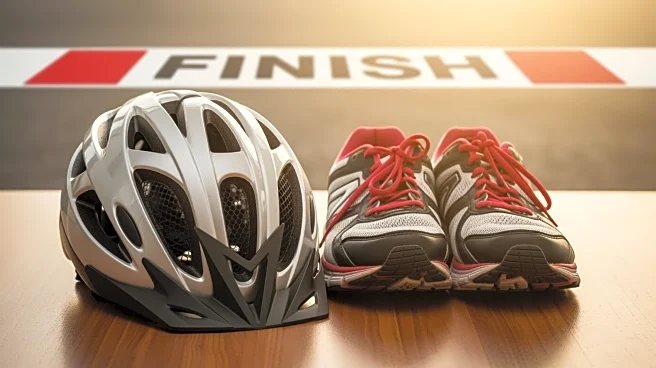What's Happening?
Natalie Grabow, an 80-year-old triathlete, has made history by becoming the oldest woman to compete in the Ironman World Championships held in Kona, Hawaii. Grabow's journey into triathlons began at the age of 59 when she learned to swim to participate
in a local sprint triathlon. Over the years, she has competed in numerous triathlons, including 28 sprint and Olympic distance races, 50 half-Ironmans, and 16 Ironmans. Her recent participation in the Ironman World Championship marks her 11th time competing in the event, where she completed the 140.6-mile triathlon in 16 hours, 45 minutes, and 26 seconds, winning her division. Grabow attributes her success to her rigorous training regimen, which includes working with a supportive coach, focusing on recovery, strength training, and understanding the difference between pain and discomfort.
Why It's Important?
Natalie Grabow's achievement is significant as it challenges age-related stereotypes and highlights the potential for older adults to engage in high-intensity sports. Her story serves as an inspiration to many, demonstrating that age does not have to be a barrier to pursuing athletic goals. Grabow's dedication to fitness and her ability to compete at such a high level at 80 years old underscores the importance of maintaining physical health and resilience throughout life. Her participation in the Ironman World Championships also brings attention to the growing trend of older athletes competing in endurance sports, which can have positive implications for public health and the promotion of active lifestyles among seniors.
What's Next?
Natalie Grabow plans to continue her triathlon journey with her next race scheduled for June 2026. She trains year-round, driven by her love for the sport and the benefits it brings to her physical and mental well-being. As she prepares for future competitions, Grabow will likely continue to inspire others, particularly older adults, to pursue their fitness goals and challenge societal perceptions of aging. Her ongoing participation in triathlons may also encourage event organizers to create more opportunities and categories for senior athletes, fostering inclusivity and diversity in sports.
Beyond the Headlines
Grabow's story highlights the broader cultural shift towards recognizing the capabilities of older adults in sports and other physically demanding activities. It raises questions about how society views aging and the potential for redefining what it means to be active and healthy in later life. Her achievements may prompt discussions on the importance of access to fitness resources and support for seniors, as well as the need for tailored training programs that accommodate the unique needs of older athletes.

















